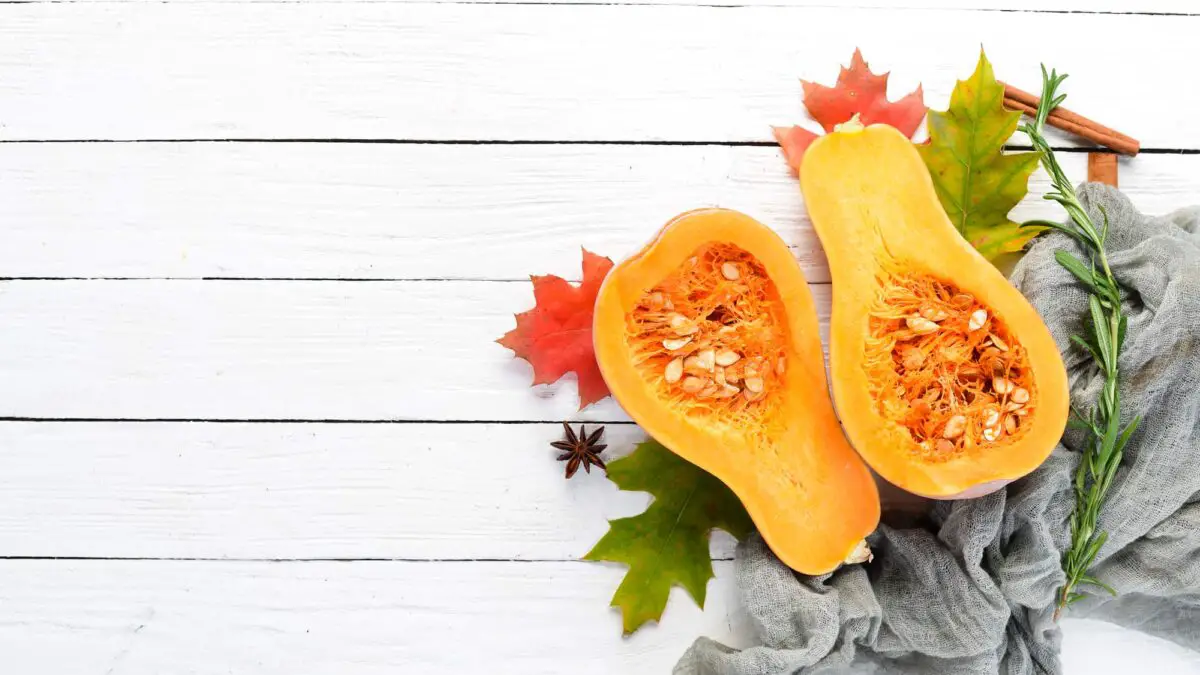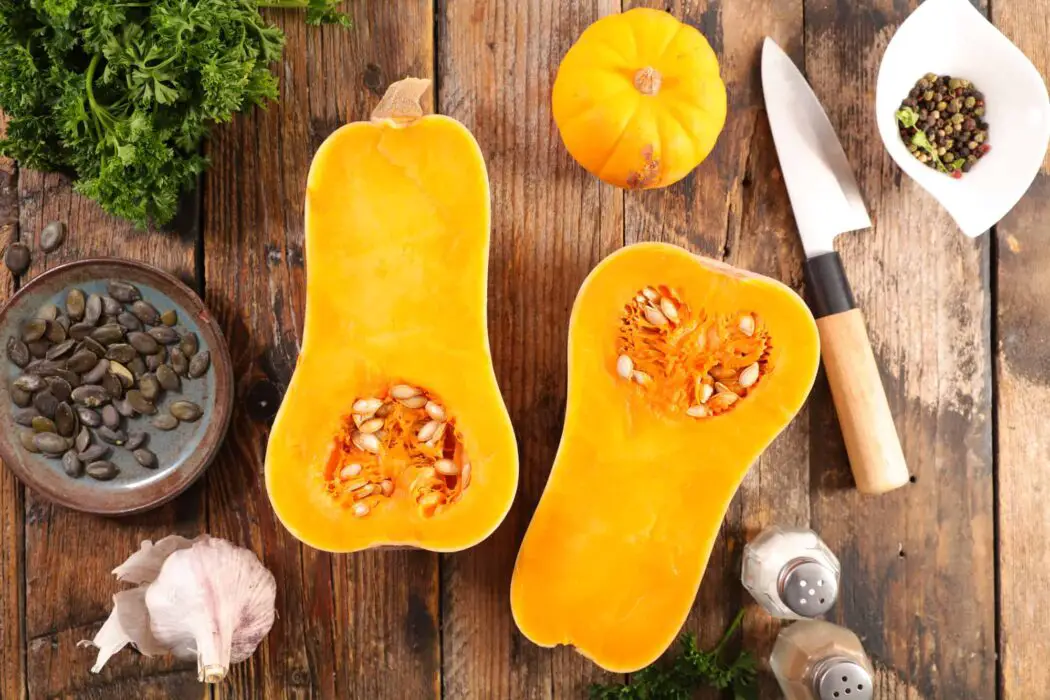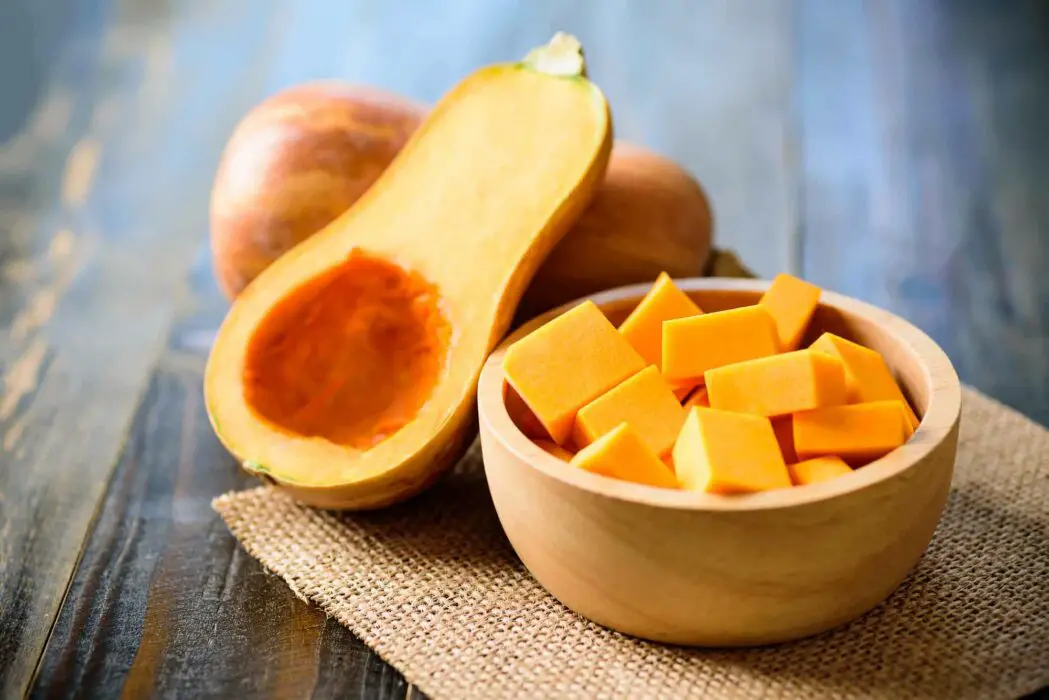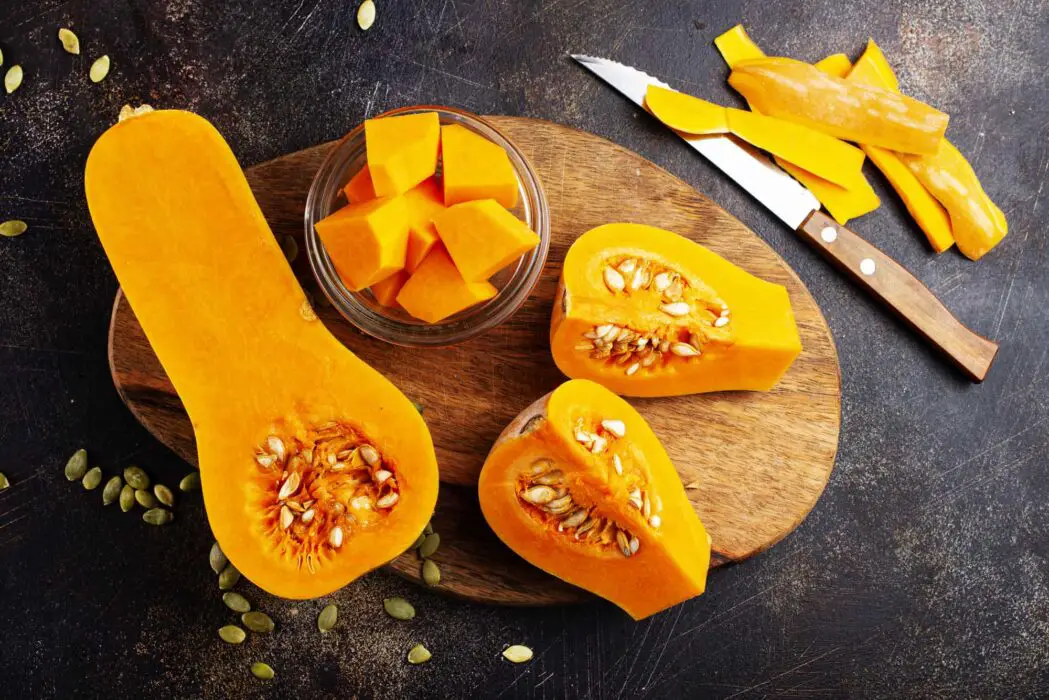Butternut squash always gives us a delicate feeling during the cold months because it is warm and comfortable food. We prepare nutritious soups and delicious side dishes, which are very healthy because they are full of vitamins. Parrots also love the warm, nutritious food from our plate because it provides them with vitamins and minerals. What about butternut squash? Can parrots eat butternut squash?
The short answer is yes. Parrots can eat butternut squash. Moreover, you need to include it in your pet bird’s diet, as butternut squash has many beneficial elements for their health. In addition, it is very easy and quick to prepare for your parrot.

What are the health benefits of butternut squash for your parrot? How to prepare it for your pet bird? I’ll give you all the details in this article, so keep reading!
What Does Butternut Squash Taste Like?
Butternut squash is part of our nutritious diet during the cold season. It has more sugar than other types of squash and a light shade of candy or brown sugar. If you cook mashed butternut squash, it will taste like a sweet potato.
If your parrot loves to eat puree because of its texture, then they will definitely love the consistency of butternut squash puree. It is less stringy than other types of squash. Therefore it is very suitable for juicing, puree, or mashing.
Can Parrots Eat Pumpkin Safely? 3 Nutritional Benefits
What Are the Health Benefits of Butternut Squash for Parrots?
Butternut squash has many nutritional benefits for your parrot. It is high in healthy fiber, as well as a variety of vitamins and minerals. Let’s take a closer look at the composition of butternut squash.
Vitamin A
Vitamin A supports parrots’ vision, which often deteriorates with age. It also helps maintain healthy feathers and skin. Parrots often suffer from vitamin A deficiency, so adding these foods to their diet is very important. The main consequences of vitamin A deficiency in birds are severe weight loss, various infections, and loss of appetite. Butternut squash is a great food for saturating your parrot’s diet with vitamin A.
B Vitamins
Vitamin B group is one of the essential elements in your parrot’s health. They support the health of the immune system, blood vessels, tissues of various organs, and the health of your pet bird’s brain. It also supports muscle tone, digestive and nervous system health while increasing stress resistance.
Vitamin C
This vitamin supports the overall health of your pet bird, which is why parrots need it especially. Vitamin C strengthens the immune system, regulates parrot blood sugar levels, and normalizes blood pressure. It also promotes healthy muscle and bone growth. At the same time, Vitamin C protects birds from stress, prevents anxiety and destructive behavior.

Vitamin E
Vitamin E is essential for muscle and tendon health in parrots, and it promotes healthy growth for young birds and supports their immune system. A large amount of this vitamin in your bird’s diet will help them resist various viruses and infections.
Fiber
Healthy fiber is important for the health of all birds, and parrots are no exception. First of all, it is necessary for the health of the digestive system because it is the fiber that provides the normal poop consistency. Without fiber, parrots can have liquid poop problems and inflammation of the digestive system.
Calcium
Primarily, calcium helps maintain healthy bones, claws, and beaks. It is also responsible for the regeneration of muscle tissue and ensures a healthy metabolism. You need to regularly add calcium-rich foods to your parrot’s diet, as birds are usually deficient in this mineral. And butternut squash works very well for this.
Magnesium
Magnesium is one of the essential minerals for the healthy recovery of all of your pet bird’s systems. It is essential for stress resistance, heart health, bone health, muscle tone, and carbohydrate metabolism. The main signs of magnesium deficiency are lack of strength, cramps, and weight loss. Magnesium deficiency is deadly for parrots, so be sure to add magnesium-rich foods to your parrot’s diet.
Zinc
Zinc is important for the metabolism of parrots, maintaining insulin levels, developing cartilage and bones, and a healthy immune system. Its deficiency in the diet of parrots leads to various metabolic disorders. Zinc is important for your parrot pet’s overall well-being, so be sure to add this food to their diet.
Can Parrots Eat Fennel? Is It Safe for Them?
Can Parrots Eat Cooked Butternut Squash?
As you can see, butternut squash is very useful for parrots. How can you cook it in the best way to preserve its beneficial properties?
The easiest and healthiest way to prepare butternut squash for your parrot is to bake it in the oven. Cut it into pieces and bake 350 to 400 degrees. Roasting time depends on the size and the liking of your pet bird. Some birds like soft squash and some parrots like it when it is hard. Let it cool and feed your parrot in small bites.
Your parrot will let you know what temperature of the squash they like. Some birds like to eat warm and flavorful food, and some like cold food. Give your parrot options and let them choose, as long as you don’t feed them with very hot food!

Can Parrots Eat Raw Butternut Squash?
Raw butternut squash is also a great choice for your parrot. Thus, it will definitely preserve all its nutritional properties and will be a real superfood full of vitamins and minerals.
This is a great option for those birds who don’t like soft or warm food. Besides, you don’t have to waste time cooking – just cut it into small pieces for your parrot to eat comfortably.
Can Parrots Eat Cherries? One Main Rule to Follow
Can I Juice Butternut Squash for My Parrot?
Butternut squash is slightly less convenient for juicing than other vegetables and fruits, as you need to thoroughly peel it by cutting off the skin and removing the seeds.
A little tip. Place the butternut squash in the microwave for a couple of minutes to soften the skin and peel it faster.
You can give your parrot a taste of butternut squash seeds. Then cut the pulp into pieces and place it in a juicer. You can mix pumpkin juice with other fruits such as pineapple for a sweeter flavor or add a pinch of cinnamon for flavor. You can also add a piece of aloe vera for the best health benefits. Experiment and find a flavor your pet bird will love!
Can Parrots Eat the Skin of the Butternut Squash?
All squash are completely edible for birds. However, this does not mean that your parrot will love the taste of butternut squash skin, as it is very tough and thick. When slicing, you can keep the skin but be prepared for your pet bird to eat only the pulp.
However, baking the butternut squash will soften the skin, and your parrot may like it. The most important rule is to choose organic vegetables and fruits to ensure that the peel is free of pesticides.
Can Parrots Eat Butternut Squash Seeds?
I have already told you that butternut squash is completely edible for birds. It means they can eat seeds too. And if the peel seems hard and tasteless to them, then the seeds can be fun entertainment. You can use them as a pleasant treat or reward.
Butternut squash seeds are rich in beneficial composition because they are a source of large amounts of fiber and help to improve the digestive system. Your parrot will love baked or raw butternut squash seeds, and you can even boil them. The main thing is to avoid store-bought seeds with salt because it is harmful to parrots.

Conclusion
Summing up, we have found out that butternut squash is a very healthy food for parrots. It has many nutritional benefits and contains a variety of vitamins and minerals. You can chop a fresh vegetable for your parrot, bake it, or boil it. Your parrot will enjoy this snack a lot!


